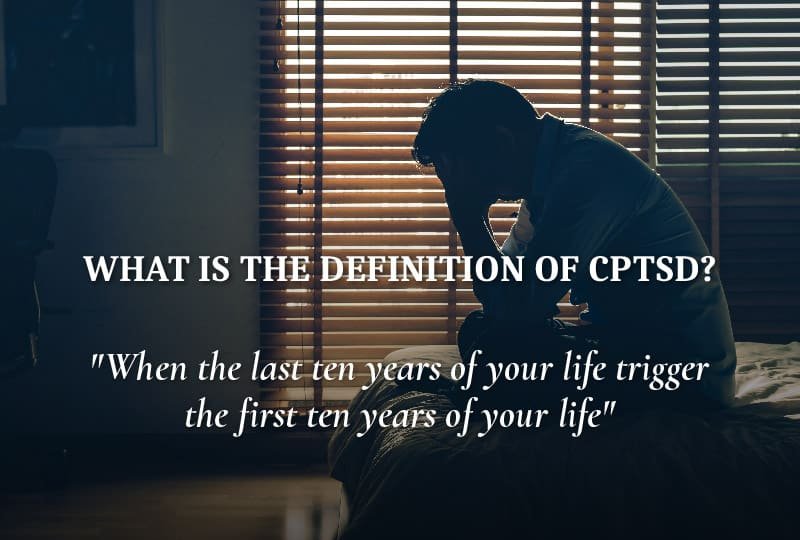How the CPTSD Foundation Can Help You Heal From Toxic Abusive Relationships
PMH Announces New Partnership with CPTSD Foundation.

Are you experiencing reoccurring attachment challenges in relationships, problems maintaining long-term relationships, trust issues and actually connecting with relationships around you? Have you experienced a tough childhood, emotional or physical abuse in a toxic relationship? Is your “picker” broken in finding partners in your life?
As Dr. Jamie, an expert in CPTSD Healing, says, did the last ten years of your life trigger the first 10 years of your life?
If that is the case, you might be experiencing CPTSD (Complex Post Traumatic Stress Disorder).
What is CPTSD?
CPTSD is linked to ongoing or repeated traumas that originate from childhood. Sometimes, as Dr. Jamie at PMH says, the letters CPTSD can also stand for Childhood Post Traumatic Stress Disorder too.
Complex Post-Traumatic Stress Disorder (CPTSD) describes the results of ongoing, unavoidable, relational trauma.
Complex PTSD always involves being hurt by another person. We believe that so many have this as an untreated condition and as we all know, “hurt people, hurt people!”
We also refer to the childhood psychosocial and parenting challenges as Adverse Childhood Experiences or ACES. These hurts are continuing, repeated, and often involve a loss of safety as a child. The ACES study on the CDC website is an amazing resource to understand this phenomenon.
Dr. Jamie has often mentioned that unresolved childhood experiences that make up CPTSD might be in almost everyone, as no parent has found the “holy grail” of parenting.
Situations that cause or trigger CPTSD may include:
- Experiencing narcissistic injuries, abuse, or neglect as a child.
- All Intimate Partner Violence (IPV): physical, sexual, emotional, and financial.
- Repeatedly bearing witness to violence or abuse in a high-conflict relationship.
- An extended period of not being loved or prioritized by a primary caregiver.
- A long period of psychological, emotional, and mental abuse.
- Intergenerational trauma passed down by our primary caregivers.
Primary CPTSD Symptoms include:
- Ongoing fight, flight, and fear challenges.
- Lower self-esteem.
- Attachment issues in relationships.
- Trust issues with the world around them.
- Problems maintaining long-term relationships.
- Difficulty feeling connected to other people.
- A belief that they are worthless.
- Feelings of emptiness or hopelessness.
- Feeling they are permanently damaged or flawed.
- A belief that nobody can understand what happened to them.
- Having regular suicidal feelings.
- Experiencing physical symptoms such as headaches, chest pains, and stomach aches.
CPTSD Foundation, our New Partner
Partners in Men’s Health is currently curating and developing international resources for men with CPTSD, to support their healing journeys. We are pleased to introduce one of our first partners—the CPTSD Foundation. Their organizational goals include ending the cycle of complex relational traumas by providing the safety, life skills, education, and reparative experiences a survivor needs so to create new habits and experience optimum health in every area of life.
The CPTSD Foundation offers powerful daily touchpoints as a supplemental resource for those seeking to feel more connected and less alone, particularly when facing emotional challenges.
CPTSD programs, resources, and the foundation’s safe, compassionate, and diverse community provide an innovative approach while ensuring inclusion and equity of treatment for anyone healing from complex relational trauma. The CPTSD Foundation states:
Adult survivors of complex trauma often experience alienation, chronic mistrust, chronic physical pain, re-victimization, debilitating flashbacks, nightmares, body memories, anxiety, dissociation, severe depression, toxic shame, auto-immune disease, along with other profoundly distressing and potentially life-altering symptoms.
CPTSD Foundation
How to Heal From CPTSD?
There are things that can help you through your recovery from CPTSD, but it’s an ongoing process. CPTSD can be triggered at any time.
When your past calls, remember that you have the ability to control how you respond to its call. You do not have to be a slave to the past. In fact, you can start today. You can always be your own trauma therapist and retrain your brain.
Dr. Jamie
Yes, flashbacks are very painful, but there are things you can do that may help. As Dr. Jamie reminds us, we are much more in control of our healing from CPTSD than we think. We can actually re-parent ourselves and find our own healing path.
It comes down to two things:
- Emotional self-regulation
- Social co-regulations
Which means we have to be in touch with our own bodies and stress. When we feel unsafe, we should befriend our nervous system. Dr. Jamie sits on the Polyvagal Institute’s Advisory Board and believes that this approach is the key to our healing from CPTSD.
It also means that we can no longer hang around unsafe, toxic individuals who control us, demean us, and emotionally take us for granted. We have to develop a “new family of choice” who are supportive and loving and provide us with corrective emotional experiences in our lives.
Help for Your Recovery Exists
We’re excited about our partnership with the CPTSD Foundation as it means more options for those who need support.
You can’t stop the emotional waves, but you can learn to surf; to let go of past that is trying to pull you underwater, and learn that these toxic emotions come and go in waves. It’s best not to fight against them but to ride with them.
PMH Team
Now that you have a better understanding of why the CPTSD Foundation has been brought into our PMH community, please check our resources page and receive a very deeply discounted way to begin this process.
Like the article?
Get in touch with Mila
Did you relate to this article? Would you just like to confidentially discuss your experiences? If you have any questions, suggestions or would just like to get in touch with me, please be free to do so, using this confidential form. We will not sell or distribute your email address to any third party at any time. Read our Privacy Policy.